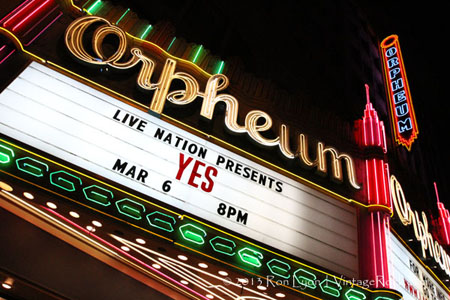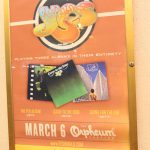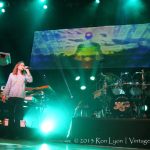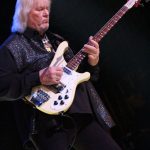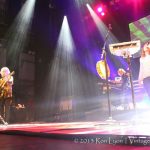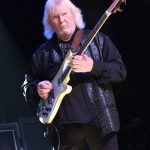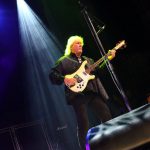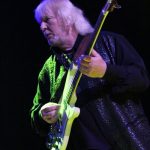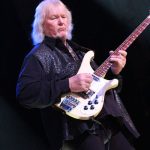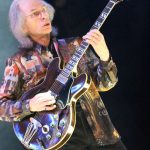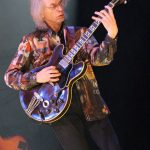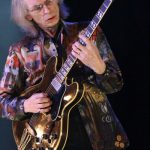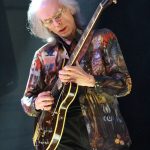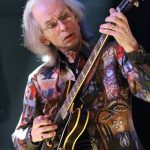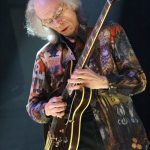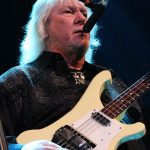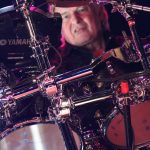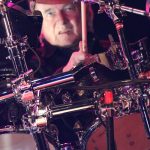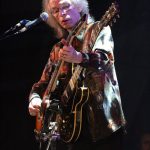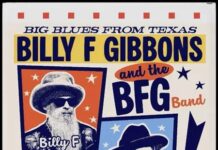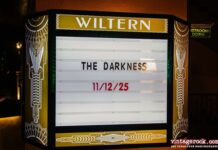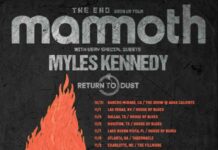Review by Shawn Perry
Photos by Ron Lyon
It’s not your Grandfather’s Yes anymore. Just don’t tell that to the fans (many grandparents themselves) resistant to the perpetual change the band has experienced in recent years. Maybe it’s just something the old codgers are going to have to get accustomed to: High turnover affecting the bands we love and grew up. Either that, or they retire and we’re left with the old records and tribute bands. It’s a tough choice.
The Yes situation has been a sensitive issue for some time. Jon Anderson, the group’s original singer and a major player in their success, is actively recording and touring. He’s publicly expressed misgivings about his dismissal from Yes after suffering from acute respiratory failure in 2008. And indeed it was a bit of a shock when the band elected to carry on, hiring Benoît David, a singer from Yes tribute act Close To The Edge, to tour and make Fly From Here, the last Yes studio album. Many complained that Yes should pack it in, including the band’s flashiest former keyboardist Rick Wakeman.
When David’s own health problems cost him his job with Yes in 2012, many speculated in the immediate aftermath that Anderson’s return was palpable. However, Jon Davison, a singer from another Yes tribute band Roundabout, was quickly brought in to finish out 2012. Tonight at the Orpheum Theatre, the third show of their 2013 spring tour, was to be a real test for Davison, who along with guitarist Steve Howe, bassist Chris Squire, drummer Alan White and keyboardist Geoff Downes, would be performing three classic Yes albums — Close To The Edge, Going For The One and The Yes Album — in their entirety.
Within the comfy confines of the Orpheum, just about anyone on that stage is bound to be spectacular. But the turnout for Yes bore a special glow, and anticipation was running high. Predominantly in their late 40s, 50s and beyond, the diehards still hold fast to their ideas of Yes, many wishing Anderson was there, but in full acceptance that after five years, that isn’t going to happen anytime soon. The key to tonight was really the three albums themselves. Speculation ran far and wide as to how certain songs, especially the ones rarely played live, would be interpreted. The lights lowered and the fluttering waves of Stravinsky’s “Firebird Suite” messaged the devoted. You could feel the mounting excitement in the room about hearing this music, regardless of who was on stage.

OK, that last part isn’t entirely true. Steve Howe was hands-down the VIP of the night from the moment those first angelic notes of “Close To The Edge” splayed their effervescence over an ebullient audience. He spent a good portion of the show reaching over one guitar to play another while nimbly nudging his pedal steel on wheels off to the side. This is the kind of stage craft and instrumental wizardry that sustains the group’s credibility.
Actually, the whole band found their footing quickly from the very first number. A video of discordant images and swirls played overhead while epic piece unfolded. And if you closed your eyes, as many did to the sway of the melodies, you just might think Davison’s vocals were everything the songs needed.
Under as much scrutiny was Geoff Downes, tasked with playing those intricate little parts so well conceived, placed and integral by Rick Wakeman. Like the caped wonder, Downes was surrounded by an arsenal of keys, his attack a tad less elegant but just as lethal. Like Davison, serving the songs without derailing them into stratosphere is his job with Yes. When the music is this precise, even the slightest alteration can stir the cauldron of bad consequences like porridge at the petting zoo. You just don’t mess with a sure thing. To that end, there was little deviation from the original recordings.
The always reliable “Siberian Khatru” ended the first album of the evening before images from Going For The One graced the screen and the band exploded into the spirited title track. For the rarely-if ever played-live “Turn Of The Century,” Howe worked no less than three guitars, while the rest of the band operated easily within the ethereal mood of the tune. Here was another prime example where Davison, who never spoke to the audience and barely moved from his spot, accurately served the song, giving it legs before the packed theater.
In time, the instrumentation would expand and contract, taking full advantage of the intimate setting. On “Wonderous Stories,” Howe strummed what appeared to be a Portuguese acoustic vachalia while Davison handled a six-string acoustic guitar. For “Awaken,” Squire brandished his triple-neck bass, adding just the right touches to one of the night’s most epic pieces. At the song’s climax, confetti shot from cannons of each side of the stage, covering the first 20 rows in riotous, satisfactory fashion.
After the 20-minute intermission, Yes finished up the night with the earliest of the three albums on the bill, The Yes Album. “Starship Trooper” may have been the biggest crowd-pleaser of the evening. Following the album’s sequencing, the arrangement of “I’ve Seen All Good People,” which typically ends a Yes show, stayed closer to the parameters of its studio counterpart, making way for the album’s last two tracks, “A Venture” and the magnificent “Perpetual Change.” It was only too obvious that they’d encore with “Roundabout,” but maybe that gives them a good reason to tackle the rest of Fragile next year.
Meanwhile, rumor has it that after this tour, the band will step into the studio to make a new album with Davison. Clearly, as Yes moves forward, the possibility of a reunion with anyone seems more unlikely. Perhaps at this juncture, the best thing longtime Yes fans can do is lay back and watch the fireworks. As long as both Yes and Jon Anderson are still out there, touring and recording, you’re essentially getting two Christmases instead of one.



